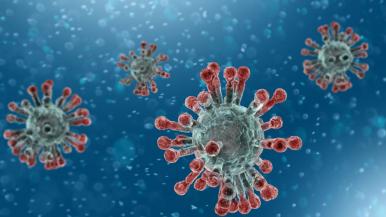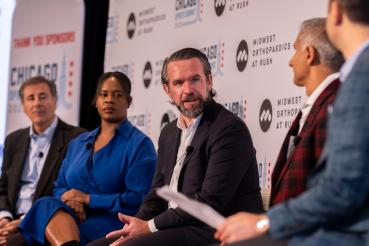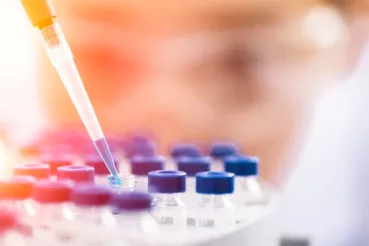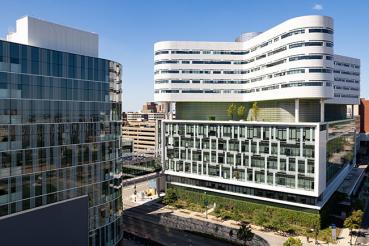Rush University Medical Center is recruiting participants for a nationwide trial of a COVID-19 vaccine, known as AZD1222, developed by the University of Oxford in England and AstraZeneca, a multinational pharmaceutical company. Rush will recruit 500 adults age 18 years or older who are at an increased risk, such as being an essential worker or living in a crowded or multigenerational household or congregate facility.
To be eligible for the trial, potential participants cannot have a known history of COVID-19 infection; a medical condition that would make it difficult for them to complete multiple follow-up assessments during the two-year study; an impaired immune system; or be pregnant or breastfeeding.
The trial, led by AstraZeneca, aims to test the vaccine’s safety, effectiveness and ability to produce an immune response for the prevention of COVID-19.
The COVID-19 pandemic has caused more than 730,000 deaths worldwide to date and massive disruption to daily life, with devastating health and financial impacts. Rush now has joined the worldwide search to find a vaccine that potentially can protect against the disease.
“Currently, there are interventions to prevent COVID-19, and accelerated vaccine development is urgently needed,” said Dr. Beverly Sha, professor in the Division of Infectious Diseases in the Department of Internal Medicine at Rush Medical College, who is leading the trial at Rush. “A safe and effective vaccine for COVID-19 would help stop the spread of the disease and decrease the number of people who will die from it in the future.”
The double-blind, Phase 3 clinical trial will enroll approximately 30,000 participants at sites nationwide. Rush is part of the National Institutes of Health COVID-19 Prevention Network, a group of clinical research sites that aims to enroll thousands of volunteers in large-scale clinical trials testing a variety of investigational vaccines and monoclonal antibodies intended to protect people from COVID-19. The AstraZeneca trial is funded by the National Institute of Allergy and Infectious Diseases, part of the National Institutes of Health, and the Biomedical Advanced Research and Development Authority, part of the U.S. Department of Health and Human Services’ Office of the Assistant Secretary for Preparedness and Response.
Vaccine can’t cause COVID-19, caused mild or moderate side effects in earlier studies
“The AstraZeneca vaccine uses a chimpanzee adenovirus (common cold virus) that is created and altered in a laboratory so that it is unable to replicate. Because there is no live virus or even a whole virus, recipients of the vaccine cannot develop COVID-19 illness from the vaccine,” Sha said.
The modified adenovirus delivers DNA from SARS-CoV-2 (the virus that causes COVID-19) that expresses (helps produce) a protein on the surface of the virus commonly known as the ‘spike’ protein. “The spike is the part of the coronavirus that attaches to receptors on the surface of human cells and enables the virus to enter the cell,” Sha explained. “We hope the vaccine will stimulate the creation of antibodies (proteins the immune system produces to fight disease) that target the spike protein, which could prevent the virus from infecting a human cell, and thus prevent disease.
“This is a phase three trial, which means that enough people have received the vaccine to determine that it appears to be safe and there is some sign that this vaccine candidate can be effective. The most common side effects were generally mild or moderate and consistent with those of other vaccines already on the market, such as a sore arm, redness or soreness around the injection site that resolves within a short amount of time. Some patients had a fever, chills, headache, fatigue, and body aches,” Sha added.
Based on data from the vaccine’s phase one and two studies, participants will receive two doses of the vaccine — the first dose on day one and the second dose on day 29 of the trial. Two of three participants will receive the vaccine, and the third will receive a placebo. Study staff and participants will not know what was given — a placebo or the vaccine.
“Preliminary data in previous studies show that antibodies develop after one dose but are better after two doses,” Sha said. “After two doses, the antibodies produced were able to neutralize the virus in laboratory tests in 100% of the samples researchers analyzed. This large phase three trial will help us determine if these antibodies prevent a person from becoming infected with the COVID-19 virus and/or reduce the severity of the disease.”
The Rush study team will decide which interested participants are chosen to enroll in the trial at the Medical Center based on the study’s inclusion/exclusion criteria. Participants will receive the vaccine at Rush, starting in the first week in September. Participants in the trial will be compensated for their time and will be followed for two years to see if they develop COVID-19, with nine in-person visits at Rush along with follow-up phone calls.
During this time, researchers will conduct interim analyses to assess the benefit of the vaccine. “If the vaccine is found effective and approved for widespread use, the CoVPN network is working on a program for placebo recipients to get the vaccine,” Sha said. “We will still want to follow up with participants for the full two years to determine how long any antibodies last.”
If a participant develops symptoms consistent with COVID-19, they will be quickly tested at Rush by the study team. Participants who develop COVID-19 will be provided with a digital health device that allows for continuous monitoring of heart rate, respiratory rate, and oxygen levels at home. The study team will be notified of any concerning measurements and will initiate medical intervention if needed.
“We want to enroll those who are at a higher risk from COVID-19, including minorities and older adults, given the impact COVID-19 has had on these populations,” Sha said.
Those who are interested in participating in the trial can email ID_Research_COVID19Vaccine@Rush.edu or call (312) 563-1345 for more information.




